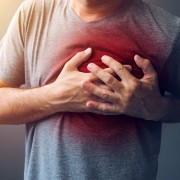Who is at risk for a heart attack?
Some tips to spot and prevent a heart attack

There is a difference between heart attack and stroke, although the after-effects on either one can be devastating. During a heart attack, the heart muscle actually does not get enough blood to it causing damage to part of the heart. On the other hand, not enough blood getting to the brain, which can cause brain damage, causes a stroke. The obstruction of blood flow to the brain may cause the patient to suddenly lose the ability to speak or one side body being paralyzed, and trouble speaking or smiling, and loss of vision on one side only.
Signs of an Impending Heart Attack in Men
- Chest pain
- Weakness or dizziness
- Nausea
- Sweating
- Shortness of breath
- Heart palpitations
Symptoms of a potential heart attack in women can be similar to men, but there are also other signs as well. These other signs are:
- A feeling of heaviness in their chest, so much so as to make it hard to catch their breath.
- Pain or discomfort in one or both arms, the stomach, jaw, back and/or the neck.
- Shortness of breath, just as with men.
- Some women said they felt like they had the flu with symptoms such as nausea, sweating, and breaking out into a cold sweat.
Ways to Prevent a Heart Attack
Learning how to lower blood pressure goes hand in hand with keeping your heart healthy. It is as simple as making some changes to the choices you make every day. These choices are:
- Food choices
- Sleeping pattern
- Exercise and/or meditation
- Cease smoking
- Consumption of alcohol
- Daily water intake
ALL of these decisions affect your potential of having a heart attack or a stroke. When you see someone in the public eye having to get a stent because of having a heart attack, or worse yet, if you know someone who had a heart attack or stroke, it makes you realize how fragile life is.
Making the right food choices could lower the risks of heart attack. Eating food with high salt content, saturated fat and consumption of alcohol can raise the blood pressure, cause heart-stressing weight gain, increase cholesterol levels and clog arteries.
As for daily water intake, dehydration can alter whole blood viscosity, plasma viscosity, and fibrinogen that are risk factors for coronary heart disease.
Exercise is proven to reduce your weight, improve muscle tone and strength, increase endurance, lower blood pressure, make you feel more relaxed and rested and strengthen your heart and cardiovascular system. Once you get hooked to exercising, you will subconsciously make an effort to cut down on unhealthy, greasy foods.
If you are having the symptoms listed above, see your doctor or emergency room. After that, of course, follow the doctor's orders about medication. Then, create a plan for a way to make a few simple changes that can change your life.
Related Articles
Why laughter may not be the best medicine
Dr Julian K.B. Tan, an interventional cardiologist at Mount Elizabeth Hospital, explains the how strong emotions may affect the heart
Read moreWhat is a heart attack?
Dr Paul Chiam discusses the importance of seeking treatment quickly in the case of a heart attack
Read moreWhat are the screening options for heart disease?
Dr Paul Chiam discusses the tests physicians use to screen for heart disease
Read moreLatest Articles
Medical Care
Can a Stroke Lead to Dementia? What You Need to Know
Can Stroke Cause Dementia? Learn about the relationship between these two in our insightful article. Discover prevention and management strategies.
Read moreMedical Care
Clearing the Fog: Dispelling Common Diabetes Myths in Singapore
Uncover the truths and myths about diabetes with insights from Harmony Thyroid, Endocrinology and Diabetes Centre. Learn about prevention, diagnosis, and management strategies for diabetes in Singapore. Get expert guidance from Senior Consultant Endocrinologist Dr. Vikram Sonawane to navigate your diabetes journey effectively.
Read moreMedical Care
Achieving Swift Recovery: Enhanced Recovery (ERAS) Direct Anterior Approach Total Hip Replacement
Consider total hip replacement with Alps Orthopaedic Centre's ERAS Direct Anterior Approach for faster recovery and reduced hospital stays. Learn about Dr. Jerry Chen's expertise in Singapore.
Read more